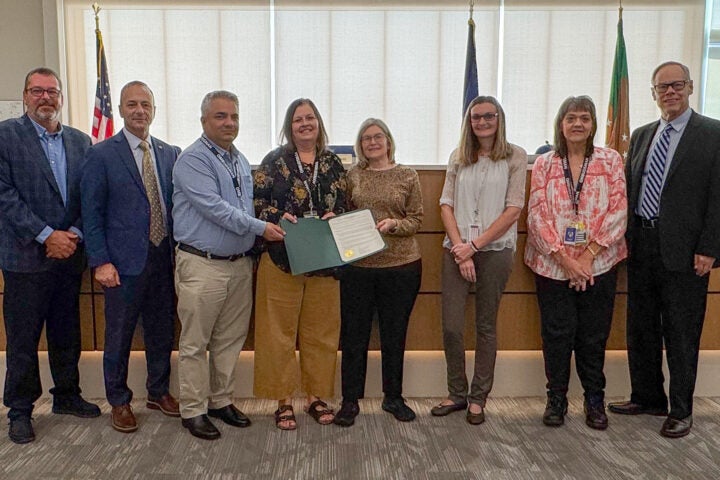Overview
The Pennsylvania Office of Child Development & Early Learning joins with counties and families in providing this program to children ages birth to 3 years old who have, or who are at risk of having, a disability or developmental delay. Services are provided in the child’s natural environments.

The Pennsylvania Office of Child Development & Early Learning joins with counties and families in providing this program to children ages birth to 3 years old who have, or who are at risk of having, a disability or developmental delay. Services are provided in the child’s natural environments.
What is Early Intervention?
Early Intervention (EI) in Pennsylvania consists of coaching supports designed to help families with children who have developmental delays or disabilities. While all children grow and change at their own rate, some children can experience delays in their development. Sometimes this can be cause for concern. Early Intervention supports young children and their families or caregivers to help the child grow and develop.
What are Early Intervention supports and services?
Early Intervention supports and services are provided at no cost to the family; supports families and caregivers as the child’s first teacher; links families to a variety of community services and supports and are individualized to consider the values, culture and priorities of the child and family. Early Intervention promotes collaboration among families, EI service personnel/providers, and Early Childhood Education professionals involved with a child. When a child attends an early childhood education setting, EI can help the early childhood staff with strategies to promote the child development.
Where do children and families receive Early Intervention supports and services?
Services and supports are embedded in the learning opportunities that exist in the child’s typical routines and within the home and community and other early childhood education programs such as child care centers, nursery schools, pre-kindergarten programs or Early Head Start/Head Start/
Where can a child be referred? Where can a family get more information?
If you or a family member has concerns about a child’s development, contact Pennsylvania Statewide CONNECT at 1-800-692-7288 or help@connectpa.net, or the Franklin/Fulton EI Service Coordination agency, Service Access & Management, Inc.
(SAM) at 717-709-4321.
Where Do I Begin?
While all children grow and change at their own rate, some children can experience delays in their development. Sometimes this can be cause for concern. Early Intervention supports young children and their families or caregivers help the child grow and develop. If you or a family member have concerns about a child’s development, contact Pennsylvania Statewide CONNECT at 1-800-692-7288 or help@connectpa.net, or the Franklin/Fulton EI Service Coordination agency, Service Access & Management, Inc. (SAM) at 717-709-4321.
When a referral is received SAM Inc. will assign an Early Intervention Service Coordinator to the family. The expectation is that the Service Coordinator will contact the family within two business days. The initial contact to families is an opportunity to gather basic demographic information, provide information to the family about Early Intervention, and schedule an initial visit with the family.
If a child will be 3 years old within 60 days of the initial call, families will be encouraged to make a referral to the Preschool Early Intervention Program.
Contacts for local programs are:
Pennsylvania Statewide CONNECT
Franklin/Fulton MH/IDD/EI does not discriminate against families who have different ethnic, cultural, race or religious backgrounds. If a family requires assistance or special accommodations, the Service Coordinator – with the help of the Early Intervention Supervisor – will make provisions as necessary to ensure timely and consistent access to services.
If at any time a need is not being met or a family has any concerns about their services, please contact Franklin/Fulton MH/IDD/EI. Complaint/Due Process Procedures can be found on the Early Intervention Announcements.
Early Intervention Service Coordination helps support families and meets the needs of infants and toddlers, birth to age 3, who have a developmental delay or disability. Early Intervention services can be provided in the home or local community.
What to expect:
- Screening for developmental delays
- Comprehensive assessment to determine if your child is eligible for services
- Working together to create a service plan to help your child reach their fullest potential
- Offering a list of the most qualified service providers specific to your child’s needs
- Coordination with your child and family, their physician and service providers to assure your child is receiving the best care for their specific needs
- Providing information, referrals and linkage to community services to provide additional supports for the child and family
Early Intervention multidisciplinary evaluations are provided by a team of professionals who evaluate all five areas of a child’s development (physical, social, cognitive, communication and adaptive) to determine if a child is eligible for Early Intervention services. If a child is eligible for Early Intervention services, this team will work with the family to create meaningful outcomes to help the child reach his or her fullest potential.
Early Intervention supports and services are provided at no cost to the family; supports families and caregivers as the child’s first teacher; links families to a variety of community services and supports and are individualized to consider the values, culture and priorities of the child and family. Early Intervention promotes collaboration among families EI services personnel/providers, and Early Childhood Education professionals involved with a child. When a child attends an early childhood education setting, Early Intervention can help the early childhood staff with strategies to promote the child’s development.
Early Intervention services available:
- Occupational therapy
- Physical therapy
- Speech therapy
- Special instruction
- Special instruction – hearing
- Special instruction – vision
- Social work


